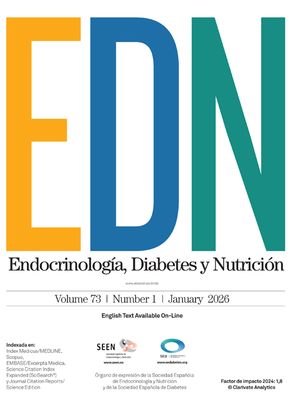Bariatric surgery is being performed increasingly in response to the epidemic of obesity plaguing the Western society. The numbers of such procedures have increased sharply worldwide, with the Roux-en-Y gastric bypass (GBP) currently being considered as the gold-standard operative treatment for morbid obesity. Its widespread acceptance lies in part in its remarkable success in reducing weight over a sustained period of time, and for having significant metabolic effects on glucose homeostasis, essentially curing type 2 diabetes in as many as 80% of patients following surgery. In fact, the metabolic benefits of this surgery often occur early before significant weight loss is achieved and their magnitude is far greater than that explained by the loss of weight alone. Most type 2 diabetic patients can be off their medications by the time they leave the hospital.1 After some months, at the same magnitude of weight loss than patients following a diet intervention program, they show a better glucose response and an improved pattern of insulin secretion to an oral glucose load.2 The mechanisms by which bariatric surgery improves metabolic aspects of obesity are not fully understood. Establishing these mechanisms will offer new insights into the physiology of energy balance and the control of metabolism. Moreover, understanding the mechanisms of this surgery will provide opportunities for the development of new treatments that may be cheaper, less invasive and/or more effective than surgery itself, which has many limitations despite its effectiveness.
Until recently, it was a common belief that weight loss after GBP was due to mechanical restriction and malabsorption, but there is a growing appreciation that other mechanisms have a role, including reduced hunger, increased satiety, altered taste and reduced preference for foods with a high fat and sugar content. One of the proposed mechanisms for reduced food intake after bypass surgery is that a secretory stimulus to the distal L cells of the ileum is produced, resulting in an increased level of gastrointestinal satiety hormones such as peptide YY and peptides of the enteroglucagon family including glucagon-like peptide 1 (GLP-1) and oxyntomodulin.3,4 These hormones are thought to stimulate anorectic pathways in the hypothalamus and brainstem leading to reduction of food intake via the so-called gut–brain axis. Besides the reduction in food intake, there is also an increased energy expenditure associated with procedures that involve a re-arranged gastrointestinal anatomy, i.e. GBP, to cause duodenal exclusion from the alimentary flow or accelerated intestinal exposure to undigested nutrients.
Changes in bile acids may also be a link between nutrient sensing and gut hormone changes and/or mechanisms for the benefits of bariatric surgeries. Besides serving as fat solubilizers, bile acids have also been found to activate nuclear transcription factors that regulate genes involved in cholesterol and glucose metabolism. Bile acids have been found to be increased in humans after GBP. It has also been shown that they can activate TGR5 (G-protein-coupled receptor expressed in brown tissue), a G-protein-coupled receptor, and that TGR5 activation regulates GLP-1 secretion. Thus, changes in bile acids may be an important mediator of changes in GLP-1, glucose and energy homeostasis with bariatric surgery.5
Another mechanism to explain improvement of metabolic aspects of obesity after GBP could be changes in gut microbiota.6 Obese and lean subjects have different gut microbiota and GBP produce changes in them. Some phylotypes of gut microbiota have the ability to induce adiposity by processing complex polysaccharides into absorbable monosaccharides, thus inducing expression of lipogenic signals in the liver. By other, not yet characterized mechanisms, microbiota also lead to reductions in AMPK (5′ adenosine monophosphate-activated protein kinase) phosphorylation and fasting-induced adipose factor expression, which result in reduced fatty acid oxidation, increased lipoprotein-lipase activity leading to generation and accumulation of triglycerides in the adipose tissue. More research is required to understand the molecular mechanisms by which microbiota signal to the host cells triggering these signaling mechanisms and what happens to them after GBP.
In this issue, Laferrère7 gives us an exhaustive insight on the role of incretins in the amelioration of carbohydrate tolerance after bariatric surgery in the short and the long term. The enhanced incretin response observed early after GBP persists over time, even until 6–20 years. However, this response is variable and not fully dependent on weight loss. She also points out the importance of meal duration, rapid gastric emptying, entero-hepatic cycle of bile acids and increased plasma dipeptidyl peptidase-4 activity in the incretin effect and their possible contribution to improved diabetes control after GBP.
In this review, other possible mechanisms by which insulin resistance improves are also mentioned, such as cytokine changes following weight loss: adiponectin increases and leptin decreases after GBP. The reduction of circulating branched-chain amino acids and the aromatic amino acids phenylalanine and tyrosine after GBP may contribute to increase insulin sensitivity. The amelioration of beta-cell function is also present after GBP, with a decrease of the abnormal elevation of proinsulin and amylin concentrations.
Finally, Laferrère ends her review mentioning that not all is good after GBP. Some of the clinical improvement has a short duration in some patients, they regain weight and/or show diabetes relapse. Others develop invalidating postprandial hypoglycemias that require reoperation and others develop malnutrition that needs parenteral administration of vitamins or other nutrients. She remarks the importance of a multidiciplinary team to follow up patients before and after bariatric surgery and the need for research to identify behavioral, social, biological, endocrine, neuronal and genetic markers of weight regain or diabetes relapse after surgery.
Please cite this article as: Caixàs A. Diabetes remission after bariatric surgery: Which are the mechanisms? Endocrinol Nutr. 2012;59:225–6.




